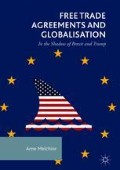Abstract
Contrary to the allegation that tariffs are low and do not matter anymore, this chapter shows that tariffs still matter. Many countries have high tariffs, and countries with low tariff averages often have “sensitive” sectors with high tariffs. The simple average of bound tariffs at the WTO (World Trade Organization) is much higher than the applied rates, and this “water in the tariffs” reduces the credibility of the WTO and its negotiations. Tariffs are still a key element in FTAs, and FTAs lead to substantial tariff cuts. Tariff preferences are discriminatory, and the hierarchies of tariff discrimination by the EU and the USA are shown as illustrations. Countries have up to 15,000 tariff lines and the chapter argues that this excessive detail is a historical anomaly that should be abolished.
Access this chapter
Tax calculation will be finalised at checkout
Purchases are for personal use only
Notes
- 1.
The number of countries is less than the number of WTO members (164) due to data availability, or because some WTO members have no bindings. Data is for 2015 in about three-fourth of the cases, and other years during 2010–2016 for the rest, except three observations with tariff data before 2010. Trade Analysis Information System (TRAINS) is a tariff and trade database of United Nations Conference on Trade and Development (UNCTAD). WTO-CTS is the Consolidated Tariff Scedules database of the World Trade Organisation (WTO). IDB is the Integrated Data Base of the WTO. All the databases are accessible through the World Integrated Trade Solution (WITS) software/search engine.
- 2.
Observe that not all tariffs are bound and therefore the bound and MFN-applied tariff averages are not strictly comparable. Since non-bound products tend to have higher MFN-applied tariffs, Table 4.1 may understate the extent of water in the tariffs.
- 3.
Bound and MFN-applied tariffs are ranked separately to show the ranges, and so countries generally have different ranks for bound and applied tariffs.
- 4.
The figure is approximate. For 2014, the figure was 14,968, based on data from the WITS/TRAINS database.
- 5.
References
Baldwin, R. (2009). Big-Think Regionalism: A Critical Survey. In Estevadeordal, A., Suominen K. & Teh, R. (Eds.). (2009a), Chapter 2, pp. 17–95.
Bown, C. A. & Irwin, D. A. (2015). The GATT’s Starting Point: Tariff Levels Circa 1947. National Bureau of Economic Research, NBER Working Paper 21782, http://www.nber.org/papers/w21782
Crawford, J. (2016). Market Access Provisions on Trade in Goods in Regional Trade Agreements. In R. Acharya (Ed.), Regional Trade Agreements and the Multilateral Trading System (Chapter 1, pp. 21–57). Cambridge, UK: Cambridge University Press/World Trade Organization.
Estevadeordal, A., & Suominen, K. (2008). Gatekeepers of Global Commerce. Rules of Origin and International Economic Integration. Washington, DC: Inter-American Development Bank (IDB).
Estevadeordal, A., Suominen, K., & Teh, R. (Eds.). (2009a). Regional Rules in the Global Trading System. Cambridge, UK: Cambridge University Press, in Cooperation with the Inter-American Development Bank (IDB) and the World Trade Organization (WTO).
Estevadeordal, A., M. Shearer & Suominen, K. (2009b). Market Access Provisions in Regional Trade Agreements (Chapter 3, pp. 96–165). In Estevadeordal et al. (Eds.). (2009a).
Freund, C., Moran, T., & Oliver, S. (2016). Tariff liberalization. In Peterson Institute for International Economics, Assessing the Trans-Pacific Partnership, Volume 1: Market Access and Sectoral Issues (Chapter 2, pp. 31–40). Washington, DC: PIIE, PIIE Briefing 16–1, February 2016.
Head, K. & Mayer, T. (2014). Gravity Equations: Workhorse, Toolkit, and Cookbook. In G. Gopinath, E. Helpman and K. Rogoff (Eds.), International Economics Volume 4 (Chapter 3, pp. 131–195). Amsterdam: North-Holland/Elsevier, Handbooks in Economics.
Melchior, A. (2006a). The Most and the Least Favoured Nations: Norway’s Trade Policy in Perspective. The World Economy, 29(10), 1329–1346.
Melchior, A. (2006b). Tariffs in World Seafood Trade. Rome: FAO (Food and Agriculture organization), FAO Fisheries Circular No. 1016.
Melchior, A. (2006c). WTO-forhandlingene om markedsadgang for industrivarer og fisk (NAMA). Oslo: Norwegian Institute of International Affairs, NUPI Paper No. 698.
Melchior, A. (Ed.). (2016). TTIP and Norway: Impact and Trade Policy Options. Oslo: Norwegian Institute of International Affairs, NUPI Report No. 9/ 2016. With Contributions from from Alvik, I., Bekkedal, T., Felbermayr, G., Theie, M. G., Grünfeld, L. A., Medin, H., Mittenzwei, K., Pettersen, I. & Veggeland, F. At https://brage.bibsys.no/xmlui/handle/11250/2425477
Pelkmans, J. (2017). The Brexit Customs Vision. Frictions and Fictions, 22 August 2017. Brussels: Centre for European Policy Research, CEPS Commentary. At https://www.ceps.eu/system/files/CEPS%20Commentary%20Pelkmans%20BrexitCustomsUnion.pdf
Robson, P. (1980). The Economics of International Integration. London: George Allen & Unwin. Studies in Economics 17 (Ed. C. Carter).
Smith, A., & Venables, A. (1988). The Costs of Non-Europe. An Assessment Based on a Formal Model of Imperfect Competition and Economies of Scale. Chapter 5. In EC Commission (Ed.), Studies on the Economics of Integration. Research on the “Cost of Non-Europe”. Basic Findings (Vol. 2, pp. 287–338). Brussels: Commission of the European Communities.
USTR. (2016). Tariff Schedule of the United States (HS 2012). Downloaded 20 March 2018 at https://ustr.gov/sites/default/files/TPP-Final-Text-US-Tariff-Elimination-Schedule.pdf
Viner, J. (1950). The Customs Union Issue. Washington, DC: Carnegie Endowment for International Peace.
WTO. (2008). Draft Modalities for Non-agricultural Market Access, Fourth Revision. Geneva: World Trade Organization, WTO Document TN/MA/W/103/Rev. 3, 6 December 2008.
WTO. (2016). Trade Policy Review. Report by the Secretariat. United States. Geneva: World Trade Organization, Trade Policy Review Body, Document WT/TPR/S/350, 14 November 2016.
Author information
Authors and Affiliations
Rights and permissions
Copyright information
© 2018 The Author(s)
About this chapter
Cite this chapter
Melchior, A. (2018). Tariffs: The Most and the Least Favoured Nations. In: Free Trade Agreements and Globalisation. Palgrave Macmillan, Cham. https://doi.org/10.1007/978-3-319-92834-0_4
Download citation
DOI: https://doi.org/10.1007/978-3-319-92834-0_4
Published:
Publisher Name: Palgrave Macmillan, Cham
Print ISBN: 978-3-319-92833-3
Online ISBN: 978-3-319-92834-0
eBook Packages: Economics and FinanceEconomics and Finance (R0)

